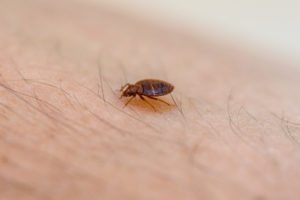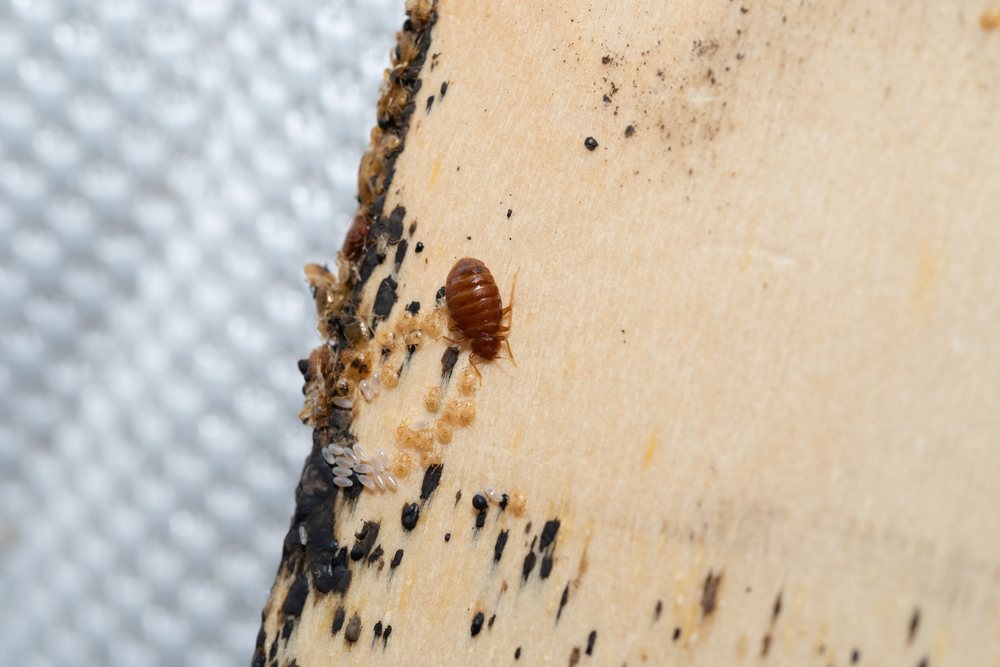Bed bugs on their own cannot eat a person alive.
And while they do bite and consume blood…
They are not capable of inflicting fatal injuries unless the victim had a pre-existing condition that was exasperated by the bites.
Bed bugs have specialized mouthparts that allow them to pierce the skin and extract blood. They typically feed for short periods, around 5 to 10 minutes, before retreating to their hiding spots.
During feeding, they inject a small amount of saliva into the skin, which contains anticoagulant compounds to prevent blood from clotting.
It’s the reaction to this saliva that often leads to the development of itchy welts or red bumps on the skin.
While bed bug bites can cause discomfort, such as itching and irritation, they do not transmit diseases or pose major health risks.
It’s important to note that although bed bugs are not considered dangerous in terms of physical harm, they can be a significant nuisance and cause emotional distress.
Infestations can be challenging to eliminate, and the psychological impact of having bed bugs in one’s living space can be significant.
Man in Georgia Jail Eaten Alive By Bed Bugs?
According to the Miami Herald, the body of a man named Lashawn Thompson, was initially thought to have been ‘eaten alive’ by bed bugs in his jail cell in the fall of 2022.
In a chilling examination performed by the Fulton County Medical Examiner, initial autopsy results deemed Thompson’s cause of death as “undetermined.” However, the report revealed a haunting detail: his body was infested with a multitude of tiny, relentless insects.
After this story came out searches for ‘can you be eaten alive by bed bugs’ spiked in Google.

A second independent autopsy report listed Thompson’s cause of death as complications due to complete neglect with untreated decompensated schizophrenia as a contributing cause.
It also declared the manner of death through dehydration, malnutrition, and severe body insect infestation listed as other significant conditions…
What Can Happen if You Sleep With Bed Bugs?
Sleeping with bed bugs can have a few potential consequences, although they are generally not severe.
Here are some things that can happen as a result of falling asleep near an infestation:
Bites and Skin Reactions: Bed bugs are nocturnal and feed on human blood while people are asleep. If you sleep with bed bugs, you may experience bites on exposed areas of your skin. These bites often appear as small, itchy, red welts or bumps. While the bites themselves are not usually dangerous, they can be irritating and cause discomfort.
Allergic Reactions: Some individuals may have an allergic reaction to bed bug bites. This can result in more pronounced itching, swelling, or even blistering around the bite sites. In rare cases, severe allergic reactions can occur that require medical attention.
Sleep Disturbance and Emotional Impact: Bed bug infestations can cause significant psychological distress. The fear of being bitten or the anxiety associated with the presence of these pests can lead to sleep problems, such as insomnia or restless sleep.

The stress and anxiety caused by the infestation can also have an impact on mental well-being and your overall quality of life.
Secondary Infections: Excessive scratching of bed bug bites can break the skin and create openings for bacteria to enter. This can potentially lead to secondary infections, although it is relatively uncommon.
Spread of Infestation: Sleeping with bed bugs increases the risk of the infestation spreading further. Bed bugs can move from infested areas to other parts of your home, including adjacent rooms or furniture. They can hitch a ride on your clothes, bedding, or personal belongings, making it easier for them to infest other areas.
Bed Bug Myth or Fact
1. Do Bed Bugs Crawl in Your Mouth?
No, it is extremely rare for bed bugs to crawl into your mouth. Bed bugs are attracted to areas near the head and upper body for feeding, but they typically bite exposed areas of the skin, such as the face and neck.
While there have been isolated cases where bed bugs have been found in the nose or mouth, it is not a common occurrence. Bed bugs are more likely to hide in cracks, crevices, and bedding during the day.
2. Do Bed Bugs Prefer Females?
No, bed bugs do not have a preference for biting females over males. Bed bugs are opportunistic feeders so gender doesn’t have any impact on their habits. They are attracted to the warmth and carbon dioxide emitted by humans, which guides them to their food source.

3. Do Bed Bugs Know When You’re Sleeping?
Bed bugs are not capable of knowing when you’re sleeping in the same way that humans or other animals do. They do not possess the cognitive abilities to perceive or understand human sleep patterns. However, bed bugs are nocturnal creatures, meaning they are more active during the night when humans tend to be asleep.
They are attracted to the warmth and carbon dioxide we emit, which leads them to feed on our blood while we are lying in bed. So while bed bugs may be more likely to feed on you during your sleep, they are not consciously aware of your sleep state.
4. Can Bed Bugs Live in Your Face?
Bed bugs do not typically live on or infest the face. They prefer to hide in and around areas where people sleep, such as mattresses, box springs, bed frames, and furniture. However, it’s important to note that bed bugs can bite any exposed area of skin, including the face if it is accessible while you sleep. Bed bugs are skilled at finding their way to exposed skin for feeding. If you suspect you have bed bugs or are experiencing bites on your face, it is recommended to thoroughly inspect your sleeping area and take appropriate measures to address the infestation.
Taking preventive measures, such as regularly inspecting your sleeping area, washing bedding in hot water, and keeping a clutter-free environment, can also help reduce the risk of bed bug infestations.




